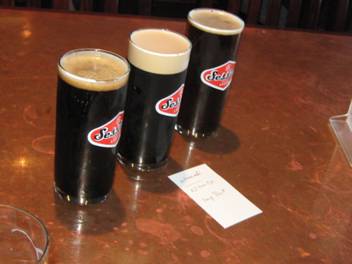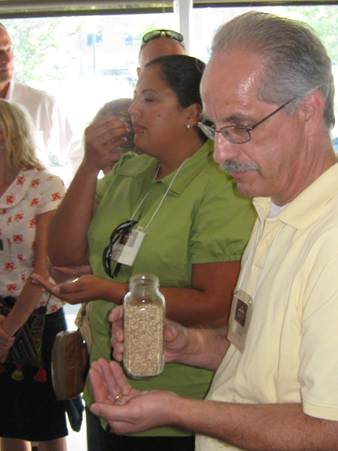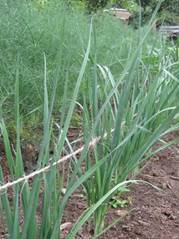Earlier this week I was fortunate to participate in the Northwest Sustainability Discovery Tour – a conference in Portland Oregon for industry leaders in hospitality, scientists and researchers, journalists and bloggers. Attended by 80-some people (and double the size of last year), the conference educated, provoked, challenged and fed us well.
Full Sail brew tasting on day two on the Sustainability Tour
So here’s a question for you, restaurateur:
What does sustainability mean to you?
The dictionary gives several definitions – let me pick a few you might agree with.
- to support, hold, or bear up from below; bear the weight of, as a structure
- to bear (a burden, charge, etc.)
- to undergo, experience, or suffer (injury, loss, etc.); endure without giving way or yielding
- to keep (a person, the mind, the spirits, etc.) from giving way
- to keep up or keep going, as an action or process
- to supply with food, drink, and other necessities of life
- to provide for (an institution or the like) by furnishing means or funds
- to support (a cause or the like) by aid or approval
- to uphold as valid, just, or correct, as a claim or the person making it
While there are numerous definitions, this one strikes me as most appropriate.
Meeting the needs of the present without compromising the ability of future generations to meet their own needs is the key principle behind the concept of sustainability.
This conference covered way too much to address in one blog. It’s a good thing there were several bloggers present; I’m looking forward to the combined reading as a result.
Perhaps the largest example of sustainability at the conference was that of the host – Truitt Brothers, a food processor/packer headquartered in Oregon. With hundreds of employees, Truitt Bros. made a conscious decision years ago to become sustainable in all aspects:
- with its employees
- with its farmers
- with its manufacturing process
- in ecological sustainability
- in financial sustainability
If companies this size can top-down and bottom-up effect organizational change to sustainable practices that generate consistent returns – why can’t the rest of the commercial foodservice industry?
The Herb Farm (Woodinville, WA)
Located thirty miles east of Seattle, The Herb Farm Restaurant was founded on a small family farm in 1985. Their philosophy has always been on locally sourced foods. For August of 2009, Chef/Owners Ron and Carrie have created a sold-out dining experience titled 100 Mile Dinners, where all the ingredients are sourced within 100 miles. Please understand, Ron and Carrie have been at this for twenty-four years! Their staff is deeply into it with total creativity. Customers are telling all their friends! Contact: Ron Zimmerman on Twitter at @HerbGuy
Chef Brian Alberg has maintained a locally sourced purchasing philosophy for his entire career. Completely supported by the owner and working in a historic hotel, he’s busy training young cooks and educating customers on how a restaurant can sustainably purchase and operate – in an agricultural area that has a very short season. If Brian can do it in Albany, rural restaurants across the country can too. Contact: Chef Brian Alberg at balberg@redlioninn.com
Scotty’s Table (Missoula, MT)
Owner Scott Gill has been passionate about sustainability for some time. His Chef de Cuisine Ben Freemole, while admitting that sustainability takes a little more work (the inconvenience factor), states that the customer response is fantastic. On Friday night, August 14, 2009, Scotty’s Table hosted a Sustainability Menu for the après-theater crowd watching the movie Food Inc. Sourcing local ingredients in Montana is a definite challenge – the growing season there is measured in weeks – not months. Contact: Ben Freemole at bcfreemole@yahoo.com
Sustainable sourcing at Full Sail Brewing
You’re Neighborhood Restaurant
There’s exciting opportunity for your local restaurant to adopt sustainable practices. Let’s take a look.
Sustaining Employees
- Treating employees with respect, both inter-personally and financially
- Involve employees in sustainable planning/execution
- Listen to their creativity
Purchasing
- Purchase materials with low ecological footprint
- Purchase locally grown
- Purchase what’s ripe in season – best quality at lowest price
- Don’t over-purchase – if you do, preserve or can it before it goes bad
Customers
- Build relationships one on one – they’ll keep coming back
- Use social media to engage customers; make them feel special
- Choose customers passionate about sustainable relationship for extra attention – they’ll spread the word
- Charge fair prices; not the maximum you think you can get
Production
- Design menu to avoid packaging, use seasonality and local, and efficiency of resources (fuel, movement, etc)
- Design recipes for maximum efficiency (old rule about cross-utilization)
- Research and implement pre-consumer waste practices
- Research and implement post-consumer waste practices
Communicate
- Communicate your sustainable practices with your stake-holders
- Customers want to know you are “moving in” the direction of sustainability
The important thing is to be authentic. You don’t have to be completely sustainable to market it – just communicate the steps you are taking. Listen to your stake-holders suggestions and inquiries. Respond to them. Incorporate your most vocal stake-holders into the process.
Here at Chalkboarder.com, we’ve implemented our Statement of Sustainability into our operations. You can find that Statement on this blog.
Moving down the road of sustainability is becoming increasingly important today. Examining the sustainability of your operation through Life Cycle Assessments, employee/team driven creativity and customer feedback will not only strengthen your business – it will also grow it.
For further information and links to sustainability counselors and practioners, please feel free to contact me.
Jeffrey Kingman
President
Chalkboarder.com
Twitter me: @JeffreyJKingman
(800) 409-8144



